
By studying the electrical pulses emitted by this banded knifefish (Gymnotus carapo) scientists hope to gain insight into what’s going on in the brain when making voluntary decisions. (Photo credit: Tiago P. Carvalho)
Electric fields emitted by knifefish can be used to predict their movements a few seconds before they occur, making these creatures an ideal model organism to study voluntary decision-making. Electric knifefish are nocturnal and live in very murky water, so they feel their way by sensing distortions in an electric field that they emit using a specialized organ.
The study showed that just before they decide to move, the fish emit a much higher rate of electric pulses in a pattern that varies from movement to movement, very similar to the pattern of brain activity observed in higher mammals like humans just before before making a decision to move. When the fish move involuntarily, as when startled, the pattern is less variable and more like an automatic reflex.
Because the electric pulses are so easy to measure non-invasively, electric knifefish could be used to study what is going on in their brain before the creatures make a voluntary decision.
The similarity between the brains of fish and mammals means that these studies could be extrapolated to humans.
Original research paper published in the Journal of Experimental Biology on October 15, 2014.
Names and affiliations of selected authors
